心理防御机制(最新版)
- 格式:ppt
- 大小:6.56 MB
- 文档页数:110
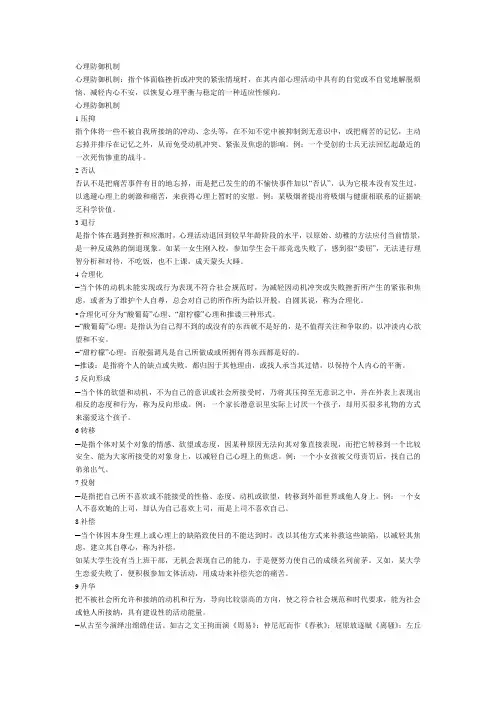
心理防御机制心理防御机制:指个体面临挫折或冲突的紧张情境时,在其内部心理活动中具有的自觉或不自觉地解脱烦恼、减轻内心不安,以恢复心理平衡与稳定的一种适应性倾向。
心理防御机制1压抑指个体将一些不被自我所接纳的冲动、念头等,在不知不觉中被抑制到无意识中,或把痛苦的记忆,主动忘掉并排斥在记忆之外,从而免受动机冲突、紧张及焦虑的影响。
例:一个受创的士兵无法回忆起最近的一次死伤惨重的战斗。
2否认否认不是把痛苦事件有目的地忘掉,而是把已发生的的不愉快事件加以“否认”,认为它根本没有发生过,以逃避心理上的刺激和痛苦,来获得心理上暂时的安慰。
例:某吸烟者提出将吸烟与健康相联系的证据缺乏科学价值。
3退行是指个体在遇到挫折和应激时,心理活动退回到较早年龄阶段的水平,以原始、幼稚的方法应付当前情景,是一种反成熟的倒退现象。
如某一女生刚入校,参加学生会干部竞选失败了,感到很“委屈”,无法进行理智分析和对待,不吃饭,也不上课,成天蒙头大睡。
4合理化–当个体的动机未能实现或行为表现不符合社会规范时,为减轻因动机冲突或失败挫折所产生的紧张和焦虑,或者为了维护个人自尊,总会对自己的所作所为给以开脱,自圆其说,称为合理化。
•合理化可分为“酸葡萄”心理、“甜柠檬”心理和推诿三种形式。
–“酸葡萄”心理:是指认为自己得不到的或没有的东西就不是好的,是不值得关注和争取的,以冲淡内心欲望和不安。
–“甜柠檬”心理:百般强调凡是自己所做成或所拥有得东西都是好的。
–推诿:是指将个人的缺点或失败,都归因于其他理由,或找人承当其过错,以保持个人内心的平衡。
5反向形成–当个体的欲望和动机,不为自己的意识或社会所接受时,乃将其压抑至无意识之中,并在外表上表现出相反的态度和行为,称为反向形成。
例:一个家长潜意识里实际上讨厌一个孩子,却用买很多礼物的方式来溺爱这个孩子。
6转移–是指个体对某个对象的情感、欲望或态度,因某种原因无法向其对象直接表现,而把它转移到一个比较安全、能为大家所接受的对象身上,以减轻自己心理上的焦虑。

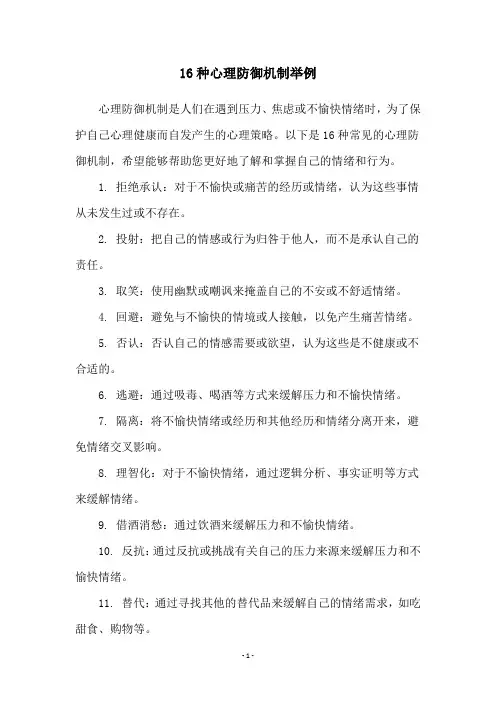
16种心理防御机制举例
心理防御机制是人们在遇到压力、焦虑或不愉快情绪时,为了保护自己心理健康而自发产生的心理策略。
以下是16种常见的心理防御机制,希望能够帮助您更好地了解和掌握自己的情绪和行为。
1. 拒绝承认:对于不愉快或痛苦的经历或情绪,认为这些事情从未发生过或不存在。
2. 投射:把自己的情感或行为归咎于他人,而不是承认自己的责任。
3. 取笑:使用幽默或嘲讽来掩盖自己的不安或不舒适情绪。
4. 回避:避免与不愉快的情境或人接触,以免产生痛苦情绪。
5. 否认:否认自己的情感需要或欲望,认为这些是不健康或不合适的。
6. 逃避:通过吸毒、喝酒等方式来缓解压力和不愉快情绪。
7. 隔离:将不愉快情绪或经历和其他经历和情绪分离开来,避免情绪交叉影响。
8. 理智化:对于不愉快情绪,通过逻辑分析、事实证明等方式来缓解情绪。
9. 借酒消愁:通过饮酒来缓解压力和不愉快情绪。
10. 反抗:通过反抗或挑战有关自己的压力来源来缓解压力和不愉快情绪。
11. 替代:通过寻找其他的替代品来缓解自己的情绪需求,如吃甜食、购物等。
12. 转移:将情绪或需求从一个方面转移到另一个方面,以缓解压力和不愉快情绪。
13. 供养:通过帮助他人或成为他人的赞助人来缓解自己的不快情绪。
14. 否认危险:对于危险或威胁,认为自己是无害的,没有必要采取行动。
15. 理性化:用逻辑和理性的方式来缓解自己的情绪和不愉快情绪。
16. 掩饰:用假象或伪装来掩盖自己的情绪和不愉快情绪。

心理防御机制——压抑和否认(最新版)编制人:__________________审核人:__________________审批人:__________________编制单位:__________________编制时间:____年____月____日序言下载提示:该文档是本店铺精心编制而成的,希望大家下载后,能够帮助大家解决实际问题。
文档下载后可定制修改,请根据实际需要进行调整和使用,谢谢!并且,本店铺为大家提供各种类型的实用资料,如职业道德、时事政治、政治理论、专业基础、说课稿集、教资面试、综合素质、教案模板、考试题库、其他资料等等,想了解不同资料格式和写法,敬请关注!Download tips: This document is carefully compiled by this editor.I hope that after you download it, it can help you solve practical problems. The document can be customized and modified after downloading, please adjust and use it according to actual needs, thank you!In addition, this shop provides you with various types of practical materials, such as professional ethics, current affairs and politics, political theory, professional foundation, lecture collections, teaching interviews, comprehensive qualities, lesson plan templates, exam question banks, other materials, etc. Learn about different data formats and writing methods, so stay tuned!心理防御机制——压抑和否认在教师招聘考试中,心理防御机制的相关知识点的考频较高,一般以客观题的考查为主。
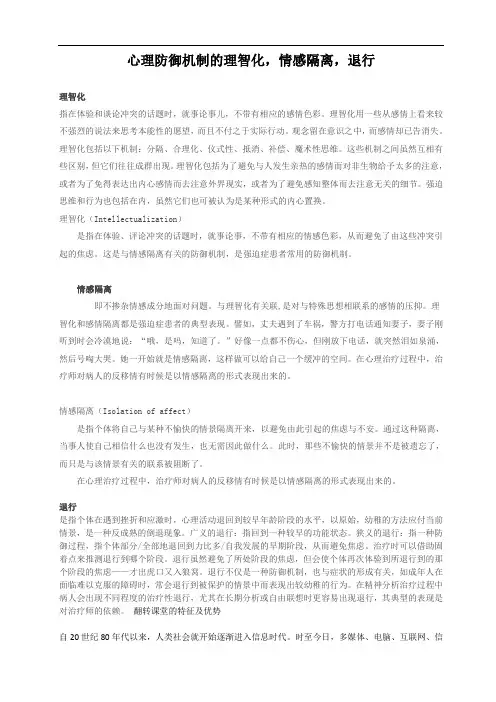
心理防御机制的理智化,情感隔离,退行理智化指在体验和谈论冲突的话题时,就事论事儿,不带有相应的感情色彩。
理智化用一些从感情上看来较不强烈的说法来思考本能性的愿望,而且不付之于实际行动。
观念留在意识之中,而感情却已告消失。
理智化包括以下机制:分隔、合理化、仪式性、抵消、补偿、魔术性思维。
这些机制之间虽然互相有些区别,但它们往往成群出现。
理智化包括为了避免与人发生亲热的感情而对非生物给予太多的注意,或者为了免得表达出内心感情而去注意外界现实,或者为了避免感知整体而去注意无关的细节。
强迫思维和行为也包括在内,虽然它们也可被认为是某种形式的内心置换。
理智化(Intellectualization)是指在体验、评论冲突的话题时,就事论事,不带有相应的情感色彩,从而避免了由这些冲突引起的焦虑。
这是与情感隔离有关的防御机制,是强迫症患者常用的防御机制。
情感隔离即不掺杂情感成分地面对问题。
与理智化有关联,是对与特殊思想相联系的感情的压抑。
理智化和感情隔离都是强迫症患者的典型表现。
譬如,丈夫遇到了车祸,警方打电话通知妻子,妻子刚听到时会冷漠地说:“哦,是吗,知道了。
”好像一点都不伤心,但刚放下电话,就突然泪如泉涌,然后号啕大哭。
她一开始就是情感隔离,这样做可以给自己一个缓冲的空间。
在心理治疗过程中,治疗师对病人的反移情有时候是以情感隔离的形式表现出来的。
情感隔离(Isolation of affect)是指个体将自己与某种不愉快的情景隔离开来,以避免由此引起的焦虑与不安。
通过这种隔离,当事人使自己相信什么也没有发生,也无需因此做什么。
此时,那些不愉快的情景并不是被遗忘了,而只是与该情景有关的联系被阻断了。
在心理治疗过程中,治疗师对病人的反移情有时候是以情感隔离的形式表现出来的。
退行是指个体在遇到挫折和应激时,心理活动退回到较早年龄阶段的水平,以原始,幼稚的方法应付当前情景,是一种反成熟的倒退现象。
广义的退行:指回到一种较早的功能状态。

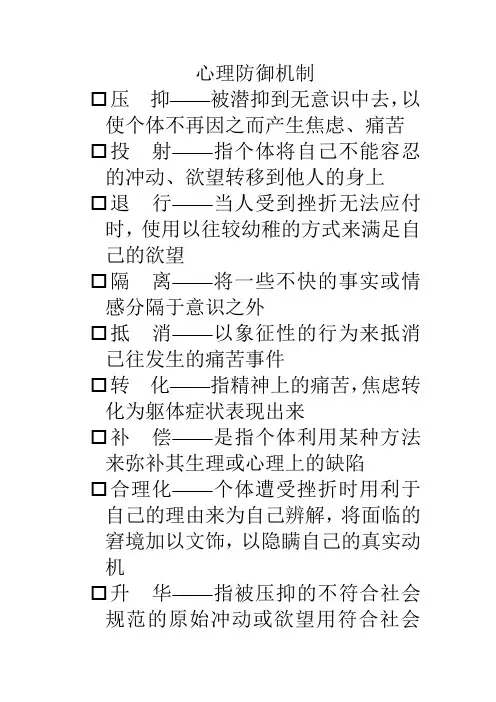
心理防御机制
☐压抑——被潜抑到无意识中去,以使个体不再因之而产生焦虑、痛苦☐投射——指个体将自己不能容忍的冲动、欲望转移到他人的身上
☐退行——当人受到挫折无法应付时,使用以往较幼稚的方式来满足自己的欲望
☐隔离——将一些不快的事实或情感分隔于意识之外
☐抵消——以象征性的行为来抵消已往发生的痛苦事件
☐转化——指精神上的痛苦,焦虑转化为躯体症状表现出来
☐补偿——是指个体利用某种方法来弥补其生理或心理上的缺陷
☐合理化——个体遭受挫折时用利于自己的理由来为自己辨解,将面临的窘境加以文饰,以隐瞒自己的真实动机
☐升华——指被压抑的不符合社会规范的原始冲动或欲望用符合社会
要求的建设性方式表达出来
☐幽默——是指以幽默的语言或行为来应付紧张的情境或表达潜意识的欲望
☐举例:有关攻击性玩笑和性的玩笑☐(人们乐此不疲)
☐每一个广为人知的悲剧后面似乎都跟着一连串的笑话,这种类型的幽默已被采用了多年。
☐1986 挑战者号
☐2008 5.12
☐一个非洲黑娃儿到成都旅游,入住一家宾馆,这时地震发生使宾馆着火,黑娃儿以最快的速度冲到空旷的平地,这时救火的消防队员很惊讶的说到———
☐“奇怪了,没见过被烧焦了还跑得这么快的"...........
☐反向形式——自认为不符合社会道德规范的内心欲望或冲动会引起自我和超我的抵制,故朝相反的途径释放导致反向形成。
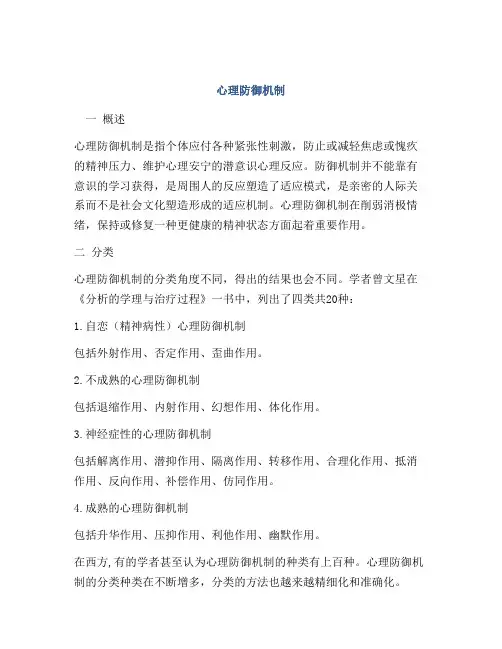
心理防御机制一概述心理防御机制是指个体应付各种紧张性刺激,防止或减轻焦虑或愧疚的精神压力、维护心理安宁的潜意识心理反应。
防御机制并不能靠有意识的学习获得,是周围人的反应塑造了适应模式,是亲密的人际关系而不是社会文化塑造形成的适应机制。
心理防御机制在削弱消极情绪,保持或修复一种更健康的精神状态方面起着重要作用。
二分类心理防御机制的分类角度不同,得出的结果也会不同。
学者曾文星在《分析的学理与治疗过程》一书中,列出了四类共20种:1.自恋(精神病性)心理防御机制包括外射作用、否定作用、歪曲作用。
2.不成熟的心理防御机制包括退缩作用、内射作用、幻想作用、体化作用。
3.神经症性的心理防御机制包括解离作用、潜抑作用、隔离作用、转移作用、合理化作用、抵消作用、反向作用、补偿作用、仿同作用。
4.成熟的心理防御机制包括升华作用、压抑作用、利他作用、幽默作用。
在西方,有的学者甚至认为心理防御机制的种类有上百种。
心理防御机制的分类种类在不断增多,分类的方法也越来越精细化和准确化。
三特点1.心理防御机制处于人的潜意识层,是无意识的心理技术。
2.心理防御机制是人们用来控制本能和情感的一种主要手段,将内心冲突排除在意识之外,以降低焦虑,维持个人的自尊、安全感和内心平衡,保护自己免于受伤害。
3.心理防御机制是动态的和可逆的,尽管防御机制可以保护个体,但如果过度地或单独地使用任何一种防御机制,将导致神经症性症状的产生。
4.每种防御机制都独立、互不相关,可以单一地表达,也可以重叠地表达。
5. 心理防御机制本身不是病理的,相反,它们在维持正常心理健康状态上起着重要的作用。
但正常防御功能作用改变的结果可引起心理病理状态。
四影响因素1.成熟因素心理防御机制的成熟是与大脑皮质的逐渐成熟相一致的。
2.社会状况因素社会环境的不同对心理防御机制有一定的影响,包括积极影响和消极影响两种。
3.性别在性别上,女性更倾向于使用内化的防御方式,男性更倾向于外化的防御方式。
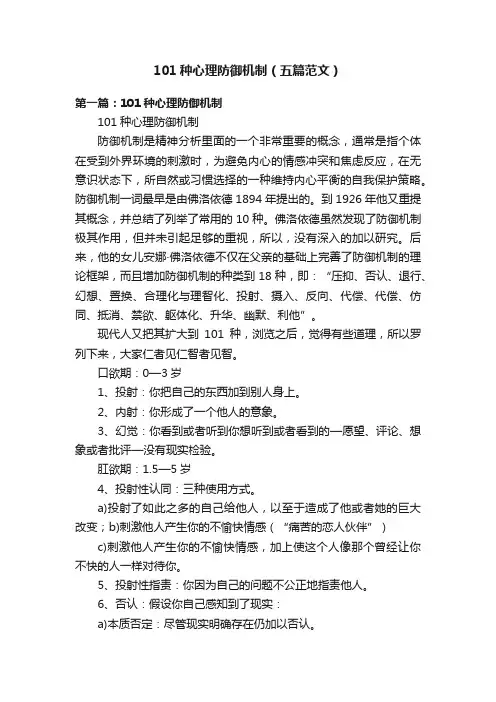
101种心理防御机制(五篇范文)第一篇:101种心理防御机制101种心理防御机制防御机制是精神分析里面的一个非常重要的概念,通常是指个体在受到外界环境的刺激时,为避免内心的情感冲突和焦虑反应,在无意识状态下,所自然或习惯选择的一种维持内心平衡的自我保护策略。
防御机制一词最早是由佛洛依德1894年提出的。
到1926年他又重提其概念,并总结了列举了常用的10种。
佛洛依德虽然发现了防御机制极其作用,但并未引起足够的重视,所以,没有深入的加以研究。
后来,他的女儿安娜·佛洛依德不仅在父亲的基础上完善了防御机制的理论框架,而且增加防御机制的种类到18种,即:“压抑、否认、退行、幻想、置换、合理化与理智化、投射、摄入、反向、代偿、代偿、仿同、抵消、禁欲、躯体化、升华、幽默、利他”。
现代人又把其扩大到101种,浏览之后,觉得有些道理,所以罗列下来,大家仁者见仁智者见智。
口欲期:0—3岁1、投射:你把自己的东西加到别人身上。
2、内射:你形成了一个他人的意象。
3、幻觉:你看到或者听到你想听到或者看到的—愿望、评论、想象或者批评—没有现实检验。
肛欲期:1.5—5岁4、投射性认同:三种使用方式。
a)投射了如此之多的自己给他人,以至于造成了他或者她的巨大改变;b)刺激他人产生你的不愉快情感(“痛苦的恋人伙伴”)c)刺激他人产生你的不愉快情感,加上使这个人像那个曾经让你不快的人一样对待你。
5、投射性指责:你因为自己的问题不公正地指责他人。
6、否认:假设你自己感知到了现实:a)本质否定:尽管现实明确存在仍加以否认。
b)行为中的否认:用行为象征性地说,“那个肮脏的现实并不是真的!”c)幻想中的否认:坚守不正确的信念,所以不愿意看到现实。
d)言语上的否认:使用特殊的词汇让自己相信现实是虚假的。
7、失区别(自体-客体混乱):你变成了别人要你变成的那个人。
8、分裂:你认为一些人是完全可恨的,另一些人是完全可爱的。
或者,你现在恨着你爱过的魔鬼。

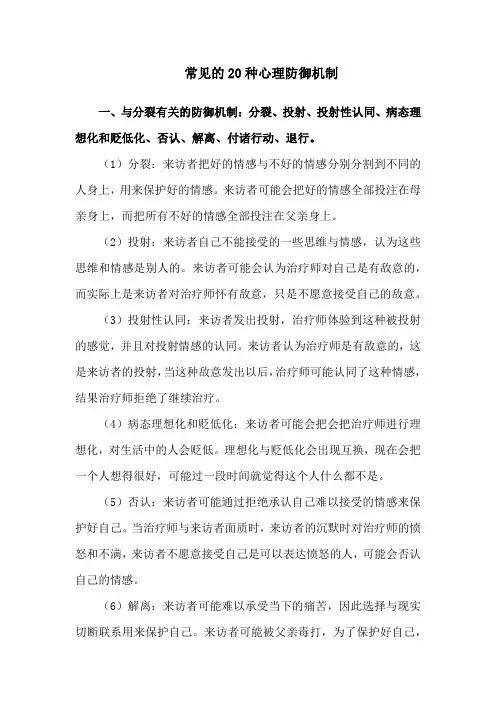
常见的20种心理防御机制一、与分裂有关的防御机制:分裂、投射、投射性认同、病态理想化和贬低化、否认、解离、付诸行动、退行。
(1)分裂:来访者把好的情感与不好的情感分别分割到不同的人身上,用来保护好的情感。
来访者可能会把好的情感全部投注在母亲身上,而把所有不好的情感全部投注在父亲身上。
(2)投射:来访者自己不能接受的一些思维与情感,认为这些思维和情感是别人的。
来访者可能会认为治疗师对自己是有敌意的,而实际上是来访者对治疗师怀有敌意,只是不愿意接受自己的敌意。
(3)投射性认同:来访者发出投射,治疗师体验到这种被投射的感觉,并且对投射情感的认同。
来访者认为治疗师是有敌意的,这是来访者的投射,当这种敌意发出以后,治疗师可能认同了这种情感,结果治疗师拒绝了继续治疗。
(4)病态理想化和贬低化:来访者可能会把会把治疗师进行理想化,对生活中的人会贬低。
理想化与贬低化会出现互换,现在会把一个人想得很好,可能过一段时间就觉得这个人什么都不是。
(5)否认:来访者可能通过拒绝承认自己难以接受的情感来保护好自己。
当治疗师与来访者面质时,来访者的沉默时对治疗师的愤怒和不满,来访者不愿意接受自己是可以表达愤怒的人,可能会否认自己的情感。
(6)解离:来访者可能难以承受当下的痛苦,因此选择与现实切断联系用来保护自己。
来访者可能被父亲毒打,为了保护好自己,进入解离状态,感受不到任何痛的感觉,就好像来访者看到一个父亲在打他的孩子一样,这个孩子与来访者没有关系。
(7)付诸行动:来访者用行动来逃避痛苦的感觉。
直接脱落不来了,可能是来访者的付诸行动。
(8)退行:来访者可能会退行到早期的母婴关系中。
来访者因为厌倦了职场的勾心斗角,于是回到了老家,每天享受父母亲的照顾。
二、与压抑有关的防御机制:情感隔离、理智化、合理化、替代、躯体化、抵消、反向形成、认同、过度情绪化、外化、性欲化、压抑、转向自我。
(1)情感隔离:来访者压抑自己的情感,但是思想还停留在意识层面。
十种心理防御机制
1. 否认:拒绝承认某个事实或真相存在,以避免撼动自己的信念或价值观。
2. 投射:把自己的感情和想法投射到他人身上,以逃避自己的不安和责任。
3. 转移:转移情绪或行为,以避免处理或面对某个问题。
4. 克制:控制或约束自己的情感和欲望,以避免出现过激或不恰当的行为。
5. 回避:避开或回避某个问题或情境,以避免面对可能带来的不适或困难。
6. 幻想:把一些不可能实现的希望和愿望转化为心理防御机制,以缓解内在冲突和压力。
7. 责备:把自己感到不满和失望的情绪转移到别人身上,归咎于他人来缓解自己的不适情绪。
8. 转移目标:把注意力和行为从一个目标转移到另一个目标,以避免焦虑和困惑。
9. 着眼将来:通过关注未来的目标和希望,以避免对当前的现实和困境产生过度压力。
10. 压抑:抑制或压制自己不适的情绪和需求,以避免向外表露和表达自己的内在经验。
1心理(自我)防御机制2psychological defense mechanism 是指个体面临挫折或冲突的紧张情境时,在其内部心3理活动中具有的自觉或不自觉地解脱烦恼,减轻内心不安,以恢复心理平衡与稳定的一种适4应性倾向。
心理防卫机制的意义,积极的意义在于能够使主体在遭受困难与挫折后减轻或5免除精神压力,恢复心理平衡,甚至激发主体的主观能动性,激励主体以顽强的毅力克服困6难,战胜挫折。
消极的意义在于使主体可能因压力的缓解而自足,或出现退缩甚至恐惧而导7致心理疾病。
8定义9自我受到超我、本我和外部世界三方面的胁迫,如果它难以承受其压力,则会产生焦10虑反应。
然而焦虑的产生,促使自我发展了一种机能,即用一定方式调解冲突,缓和三种危11险对自身的威胁。
既要使现实能够允许,又要使超我能够接受,也要使本我有满足感,这样12一种机能就是心理防御机制。
13我们可以把防卫机制的类型分为十六种,属五大类。
14(一)逃避性防卫机制15概述16这是一种消极性的防卫,以逃避性和消极性的方法去减轻自己在挫折或冲突时感受的17痛苦。
这就像鸵鸟把头埋在沙堆里,当作看不见一样。
这类防卫机制有以下四种形式:181、压抑19(repression)20压抑是各种防卫机制中最基本的方法。
此机制是指个体将一些自我所不能接受或具有21威胁性、痛苦的经验及冲动,在不知不觉中从个体的意识中排除抑制到潜意识里去作用。
是22一种:“动机性的遗忘”(motivated forgetting),个体在面对不愉快的情堵时,不知不23觉有目的地遗忘(purposeful forgetting),与因时间久而自然忘却(natural forgetting)24的情形不一样。
例如,我们常说:“我真希望没这回事” ,“我不要再想它了”,或者在日25常牛活中,有时我们做梦、不小心说溜了嘴或偶然有失态的行为表现,都是这种压抑的结果。
26压抑作用,表面上看起来我们已把事情忘记了,而事实上它仍然在我们的潜意识中,27在某些时候影响我们的行为,以致在日常生活中,我们可能做出一些自己也不明白所做的事28情。
心理防御机制(Psychological defense mechanism)[recommendation] 101 psychological defense mechanismsPsychological defense mechanism is the school of psychoanalysis. A psychological mechanism that is used to avoid interference and to maintain a psychological balance when the individual is disturbed. It was first proposed by Freud. It is often used unconsciously. Such as suppression, suppression, denial, projection, transfer, decoration, dissolving,self-settlement, compensation.The self-defence mechanism has several characteristics:(1) the defense mechanisms are not intentional, they are unconscious or at least partially unconscious. While we often do some conscious effort, the real defense mechanism is unconscious.(2) the defense mechanism protects itself and protects itself from harm by supporting self-esteem or self-improvement. From its function and nature, it can be divided into active defense mechanism and passive defense mechanism.(3) the defense mechanism seems to have the nature ofself-deception, namely to disguise or disguise our true motives, or to deny the existence of impulses, actions, or memories that may cause anxiety. Therefore, the self-defence mechanism is to defend oneself from anxiety by distorting perception, memory, action, motivation and thinking, or by completely blocking a psychological process. In fact, it is also a psychological self-protection act.(4) the defense mechanism itself is not pathological. Instead, they play an important role in maintaining normal mental health. But the result of the change of normal defense function can cause psychological pathology.(5) the defense mechanism can be expressed singly or overlapped. For example, one worker was criticized by the group leader in the workshop and said, "I don't care!" Then in the work intentionally and unintentionally fall, to make the waste to eliminate the anger of the heart, is to rationalize and the double effect of the anger.The approximate sequence of development appears1. Oral sex period: 0 -- 3 years oldProjection: you add your stuff to others.002, injective: you form an image of someone else.003, illusion: you see or hear what you want to hear or see - desire, comment, imagination, or criticism - without a reality check.2. Anal sex period: 1.5 to 5 years old004. Projective identification: three modes of use.A) projecting so much of himself to others that he or she has changed greatly;B) stimulate other people to produce your unpleasant emotions (" partner in pain ")C) stimulate other people to produce your unpleasant feelings, and make this person treat you like the one who made you unhappy.005. Projective criticism: you unfairly blame others for your own problems.006. Denial: suppose you feel the reality yourself:A) essential negation: although there is a clear existence, there is still denial.B) denial in action: symbolically speaking, "that dirty reality is not true!"C) denial of fantasy: to hold on to incorrect beliefs, so you don't want to see reality.D) verbal denial: use special words to convince yourself that reality is false.James Bond, the loss of distinction (self - object chaos) : you become the person that someone else wants you to be.008 divided: you think some people are totally hateful, others are totally cute. Or, you now hate the devil you loved.The panpsychism: you give human attributes to non-humans.Go to life: the person you see is not a person, so you don't have to worry.011. Reverse formation: you have the opposite feeling.012, offset and ritual: you do things that violate your conscience. Or you do something that makes you feel guilty, as a way of making up for yourself and punishing yourself in another symbolic form.Isolation (emotion) : you don't pay attention to your emotions.014, externalizing: you think "society" criticizes you, but actually you feel guilty.Turn to yourself: you get angry with someone, attack or kill yourself.016. Negativity: you refuse to cooperate and treat others with humility.Compartmentalization: you limit yourself by establishing relationships.018 hostile attack: you enter into a fight to hide unpleasant feelings.First genital stage: 2-6 years oldReplace: you feel close to one person but turn to another personor state.020, symbolic: you give some psychological function to make unreasonable sense.Condensation: you bring disparate ideas together and make them whole.Fantasy formation or daydream: you continue to fantasize about some sad or happy scene and know it's a fantasy.023: you lie for a purpose and for a reason.Small talk: you lie about what you don't know to reduce your low self-esteem.Suppression: you forget the idea that you shouldn't forget.Negative fantasy: you turn a blind eye to the disaster that happened to you.Libido suppresses (mental sexual repression) : you are afraid of sex or assertiveness, so you become dependent (mouth) or stubborn.028 self-suppression: three ways to use itA) one kind of function is interfered with: your ego function or self-strength stops working, so you can't feel the unpleasant result of something;B) return to early defense mechanisms: you begin to use the early defensive mechanisms of mental development;C) ineffective defense: your defenses can't sever your emotions, and such failure can lessen your guilt by punishing you.Reality check: you focus on the past and don't think about conflict.030 morphological depression: you avoid painful reality by dreaming.Suppression: you have a destination to try to forget.032. To fantasy identity: you act like the hero you like.033, to parents' subconscious and conscious hopes and fantasies: what your parents forbid you to do, to take their depraved desires into action and be punished.034 identify with an ideal image or object: you think and act like a person who you think is great.035. Identify with the attacker: you mistreat a person, because someone has abused you; It makes you feel no pain.036 to identify with the victim:Identify with the object of loss: you act like a loved one you have lost. If you always collect his souvenirs and never grieve, you are in the "assured pathologic sadness".038, identify with internal projective: you make internal projective part of your superego.Temptation attacker: you lure others through pornography or flattery to allay fears.Iv. Incubation period: 6 -- 11 years oldSublimation: you actively participate in an activity that can make your dreams come true at a symbolic level.Challenge: you tempt others to have sex or punish you, or both.Rationalization: you find an excuse to relieve tension, usually after denying some reality.You "over-analyze" and "futility" to try to solve the problem.Inverse homophobia: the more you fear, the more you do.045. Intellectualization: you are inspired by a particular behavior theory.Socialization and alienation: you use your social skills to keep you away from painful thoughts.The instinct for self-function: you give a kind ofself-function to a symbolic meaning. For example, "washing the dishes is a woman's thing," which is unreasonably equating a particular job with gender.048. Suppression of a certain self-function: you turn your self-function into an instinct and feel the impact of your guilt, so you turn off the function. For example, you can't read because reading is equivalent to prohibited sex.Idealization: you overestimate someone because --A) narcissism: alleviating the stigma associated with not being perfect;B) narcissism: you combine this person with your high self image (self object).C) love: avoid experiencing disappointment;D) empathy: they are like your perfect parents when you were a child.Belittling: you look down on someone to protect yourself-esteem.5. Adolescence and post-adolescence - the second genital phase (13-20 years)051. Humor: you're funny to avoid painful emotions.Be specific: you stop using abstract thought (which you have); You condemn some kind of "chemical imbalance", or look for a virus to avoid thinking about relationships that frustrate you.Anti-identity: you try to be different from your parents.054, small group formation: you are in the crowd to resist impulse.Abstinence: you avoid interacting with people.056. Same-sex object choice: your same-sex partner reduces your fear of gay stimulation.Vi. Miscellaneous:057, one kind of emotional confrontation another: you focus on one emotion and avoid the other.058. Excessive abstraction: you abuse theory. If you deny or rebuild reality, you may be mentally ill.Silence: you stop talking to avoid being caught.Talkativeness: you talk too much without taking care of the occasion and the topic.Avoid: you are far from certain environments that create conflict.062 passive: when confronted with an attack, you automatically choose a compliant or weak attitude.You are god's gift to the earth and have magical powers.064 passive to the initiative: "you can't fire with me; I'm gone!" You control your own lies.Somatization: you focus on your body to avoid the conflict of desire, sex and hatred.Normalizing: you are normal to be sure that you are not looking for your obvious mental symptoms.Dramatization: you put your emotions into your words to mitigate the conflict of interest.Impulsiveness: you relieve tension or unpleasant emotions with sex, eating or hatred.Substance abuse: you use a substance to quell unpleasant feelings.070. Attachment: seize a person who rejects you.Complaining: whining, you can't see your baby's wish to be taken care of.Pseudo independence: you become a lone ranger, not allowing anyone to help you.Pathological altruism: actually projecting and identifying the victim -- you deny the desire to have an appetite, project it to the poor, and then replace it with the feeling of being nourished.Gas lamp: you cause other people's mental disorders, or believe that others are mentally disturbed.075. Minimize: you recognize the reality of pain, but you despise it.Exaggerate: you pay too much for something.077, universalization: don't hate someone, think of it as a member of the devil.Rebuild reality: after you deny reality, reinvent the scene.Transference: you transfer the memory of your past situations and relationships to a person in reality. Then you forget the past with the old defense, or control it through symbolic life or the consequences of changing it.You completely forget yourself; B) you ask someone to comment on you and then you reject his or her opinion.081. Photo horror: you dodge the light to avoid your voyeuristic impulses.Apathy: you have no interest in starting emotions.083. Bullying and bullying: you put others on alert to alleviate their anxiety.Lack of compensation: you reject people who are more integrated than you are.085. Psychic spasm: jitter to reduce tension or irritation.086 introspection: you are preoccupied with inner introspection to reduce tension, or to avoid external reality.087. Qualifying agreement: you partially agree to avoid resistance.Your emotional endurance and impulse control (muscle or sexual) are weaker, and you give it a gentle connotation.Disguise: you're lying. Maybe you're used to it090, overrealism: you use secondary processes to avoid emotions.Ambiguity: you hide details.You are addicted to beauty and truth to avoid reality and emotion.093. Glib: you talk fast, but the content is empty. Physical violence: you "discard the object" to end your hatred.095. Identity with the object of injury: you hurt a bird you know (sometimes loved) and then imitate it.Formal regression: you stop using logical, time-oriented thinking.097. Hypervigilance: you will always keep one eye open, although at times it is completely unnecessary.098, the reality is the future: you imagine "if..." "Or" someday..."099 fatigue: you feel tired, but you are not sick.Confession: you are sincere and blunt, but these mask your true thoughts and feelings.Turn your self-criticism into a critic: you criticize others, instead of blaming yourself.。